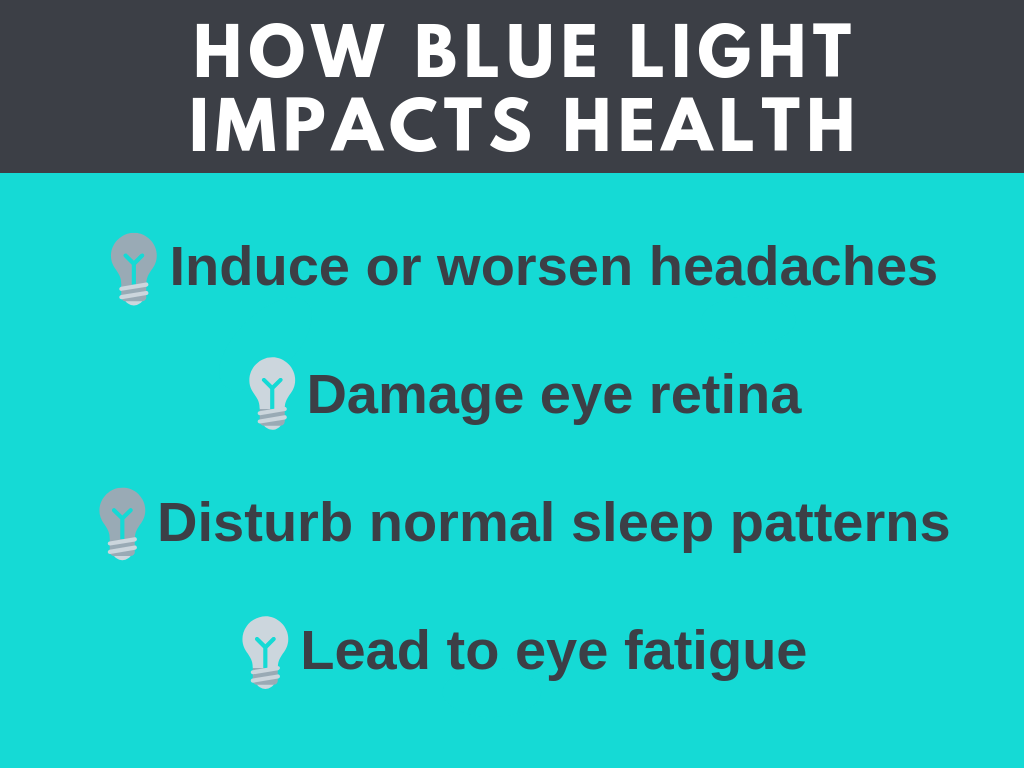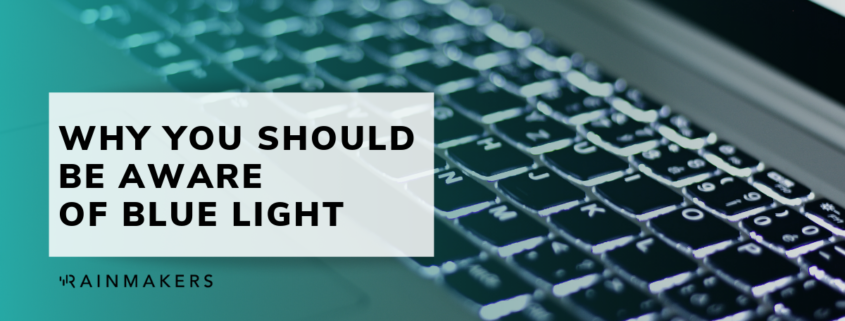Why Inside Salespeople Should Be Aware Of Blue Light
According to a recent study, inside salespeople spend about 62% of their day in sales technology and 33% of their time emailing for sales-related purposes. If you’re in sales, that’s 95% of your day spent looking at a computer screen. That doesn’t include the personal time spent scrolling through social media on breaks or after work, watching television at night, and the fact that you may use multiple screens on the job. Did you know that computer screens release blue light wavelengths that can affect your body in a negative way? Computer vision syndrome is the effect you may feel on your body from extended exposure to blue light.

What is blue light? Blue light is a short, high energy wavelength that is both in the world naturally and artificially. Blue light is released from the sun and helps regulate sleep patterns. When you’re exposed to blue light it signals the body to release cortisone to feel awake and ready to take on your day of work ahead! Then, there’s an absence of blue light when the sun sets and the body starts to produce melatonin to get ready for bed.
Blue light is given off artificially by computer and other digital screens, too. Artificial blue light tends to be stronger and more intense to the body than the natural form from the sun and since you can be exposed to it all day and all night, it can be damaging to your sleep patterns and overall well-being.
Why can it be damaging? Salespeople spend a lot of time using online tech tools in order to do their job effectively. When you spend 7+ hours a day looking at a computer (and sometimes more than one computer at a time), the effects of blue light can begin to take their toll. Some effects you may feel after just a few hours of working are headaches, blurred vision, and dry eyes. If you’ve ever noticed any of these symptoms while at work it may be caused by your screens. Over time, blue light can even cause retinal damage which can contribute to age-related macular degeneration. This is a type of retinal damage that can result in partial or complete vision loss.
How can you help yourself? If you’ve ever noticed any of these symptoms while you’re working, you know it can be painful and annoying. Computer vision syndrome can not only disrupt your workday, but your everyday life as well. So it’s important to try to take preventative measures so you don’t feel the headaches or experience problems with your vision.
Firstly, try to add blue-light-blocking tools into your life. On the eyeglasses market, you can find eyeglasses paired with blue light lenses that filter harmful rays from reaching your retina. With the retinal damage blue light can cause overtime, it’s important to protect yourself. Another tool to try out is f.lux which adjusts the light on your computer screen to be a warmer tone. Glasses and apps like this can help reduce the immediate symptoms caused by blue light.
There are a few exercises you can start to do to give your eyes a break throughout the day:
- 20-20-20: Every twenty minutes, look 20 feet away from where you are, for 20 seconds. This helps your eyes readjust to the natural light in the room you’re in, reducing eyestrain.
- Palming the eyes: Cover your eyes lightly with your palms but keep your eyes open. This gives your eyes a break in a dark environment to reduce the feeling of strain.
- Figure 8’s: Make figure 8’s with your eyes. If you’ve been staring your computer or television, this movement can help tear production so your eyes don’t dry out.
Finally, your diet can even help reduce the symptoms of blue light strain. Foods high in lutein and zeaxanthin are great for your retinas; they help block blue light and reduce your chances of suffering from age-related macular degeneration. Some foods that boost the amount of lutein and zeaxanthin you take in are kale, spinach, peas, squash, brussels sprouts, corn, and broccoli.
In sales, it’s extremely important to be mindful of the amount of time you’re spending on your computer and the effects that technology can have on the body. It may be impossible to control the use of digital screens at your job, but there are plenty of ways to help prevent the symptoms of computer vision syndrome. Additionally, while you use your computer heavily at work, try to abstain from using your phone or computer excessively in your personal time to avoid getting headaches and dry eyes caused by blue light.










